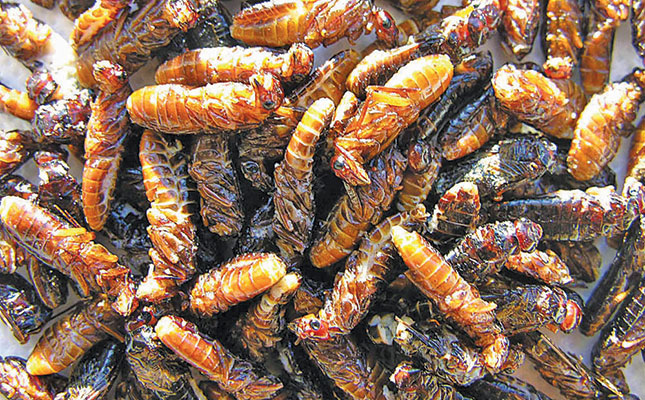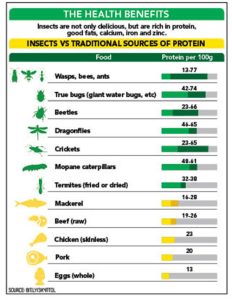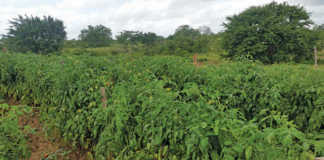
Photo: Wikimedia Commons
The Food and Agriculture Organization of the United Nations promotes edible insects as an alternative source of protein that can be introduced into human diets as well as animal feed. It is estimated that over two billion people worldwide rely on more than 1 900 insect species as food sources, and these include approximately 43 species of termites belonging to four families.
Preparation methods for insects include boiling, steaming and frying. After preparation, the insects can be preserved either by keeping them in a fridge or freezer. If uncooked, they can be sun-dried.
The practice of entomophagy, the technical term for consuming insects, has gained prominence in Asia, Africa, North America and Australia. Although the practice is still in its infancy in Europe, the European Food Safety Authority in 2015 suggested a list of insect species with high potential for use as food for humans and feed for animals.
Africa
Africa is ranked as the continent with the highest number of insect eaters, followed by the Americas and Asia. In Africa, the practice is particularly popular in the Democratic Republic of the Congo, Uganda, Zambia, Zimbabwe, South Africa, Kenya and Nigeria. In these countries, a number of termite species are regarded as a delicacy.
South Africa’s rural areas face poverty, unemployment and food insecurity, and the COVID-19 pandemic have exacerbated these socio-economic factors. Households in the Vhembe district of Limpopo, where edible termites already form an important part of the diet in rural households, have responded by increasing their adoption of entomophagy.
Communities in this area are engaged in harvesting edible termites and commercialising production.
Most people practising entomophagy in this area indicated nutrition as the main reason, followed by poverty (see pie chart). Termites are the preferred option, due to their richness in oil, which means they require little or no additional oil for frying during preparation for consumption.
Another key advantage of termites is that they are easily accessible by many rural inhabitants.
Nutritional value of edible termites
Worldwide, termites are recognised as a nutritious food, being rich in proteins (amino acids including methionine, cysteine, lysine and threonine), carbohydrates, fats, and some minerals and vitamins, and possessing high energy value.
Nutritional studies have shown that they have a higher percentage of protein by weight than beef, pork, chicken or lamb (see table). In addition, the digestibility range of insect protein is between 76% and 98%, while that of beef is estimated at 98%.
Termites are also valued for their antiviral properties and are reported to be effective as a treatment for colds, coughs, asthma, bronchitis, influenza and sinusitis. Indeed, they are seen by some as a potential source of new medicines.

Commercialisation
All of these benefits suggest an opportunity for greater commercialisation of edible termites. Already, commercialisation has helped drive an upsurge of interest. In India, it has resulted in the establishment of termite-based medicine companies, while in Africa, edible termites are sold in open markets in Zambia, Uganda, Kenya and elsewhere.
A 2022 study in Kenya reported on the inclusion of edible termites in people’s diets and on hotel menus, and listed the average income from the commodity as ranging from US$3,5/ kg to US$5/kg (about R60/kg to R85/kg) for the hotel operations and open-air markets.
These figures suggest that the commercialisation of edible termites is profitable in Kenya.
Countries such as Ghana and Burkina Faso have made animal feed, mainly for poultry, piggeries and fish farming, from edible insects. Farmers in Burkina Faso use edible termites as a protein source to feed small-stock during dry seasons when feed is scarce.
In South Africa, by contrast, this food source is not commercialised, despite the country being endowed with edible insects. This could be attributed to the limited research on edible termites being carried out in the country.
This is surprising, given that the estimated annual revenue from harvesting and selling
edible termites by an individual ranges from R2 040 to R17 680, and the country’s monthly food poverty line and lower-bound poverty line are R663 and R945 respectively. Commercialisation of edible termites presents an opportunity for income generation, particularly for poor households.
Building a sustainable entomophagy sector in South Africa
Given this potential, research and development organisations need to undertake focused studies in order to lay the groundwork of a sustainable edible termite industry.
One such organisation is South Africa’s Agricultural Research Council (ARC), which has resources and even dedicated research programmes dealing with insects. The ARC is known for its excellence in research and innovation in supporting sustainable agriculture systems and economic development, and can play a crucial role by studying this practice and steering and fostering innovation.
Innovation may include breeding edible termites, value-adding, processing edible termites, and exploring entomotherapy. Local adoption of this practice for animal feed usage could also benefit farmers by enhancing the nutritional value of feed.
The well-established mopane worm industry could be used as a learning platform for the commercialisation of edible termites. To intensify the latter, initiating awareness campaigns to educate society about entomophagy and introducing it as part of an agricultural subject in schools could boost this to become a well-established, sustainable practice.
Email Ntokozo Blessing Zitha at [email protected].











